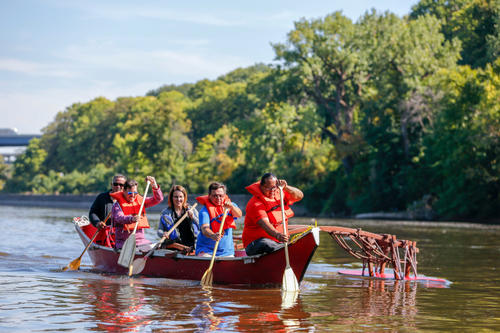University of Minnesota receives $5M grant from The Andrew W. Mellon Foundation for racial justice in higher education

Executive Vice President and Provost Rachel T.A. Croson announced today that The Andrew W. Mellon Foundation has awarded the University a $5 million grant to address racial justice and create more just and equitable futures for all through public humanities.
“This statewide initiative deepens the University’s relationships with our diverse communities, with a focus on developing new knowledge, visions and practices for inclusion and justice,” said Croson. “It will enable progress on multiple elements of our Systemwide Strategic Plan, including advancing the arts and humanities through strategic collaborations, strengthening relations with Tribal Nations, and working in partnership with underserved local communities to enhance access to higher education, among other shared goals.”
One of 16 awardees selected nationally by The Mellon Foundation’s new humanities-centered Just Futures Initiative, Minnesota Transform will collaborate with Black, Indigenous, immigrant and refugee communities to amplify historical interpretations, create new narratives and dialogues, foster community well-being and inform policy responses.
This work is inspired by and will follow a year of mass protest against systemic racism and calls for justice in the state and nation. Minnesota Transform will strategically broaden and deepen previously established relationships with communities, while building the University’s capacity to be a site for justice.
“As a society, we are facing many crises — the slow violence of global climate change due to racial capitalism, the gentrification of urban neighborhoods, the failed federal response to COVID-19, police violence — that are happening simultaneously and exacerbate long standing structures and inequalities of racism and colonialism,” said project faculty team leader Jigna Desai, a professor of Gender, Women, and Sexuality Studies in the College of Liberal Arts on the Twin Cities campus. “Support from The Andrew W. Mellon Foundation will help us to establish a wide range of collaborative University and community initiatives that will allow us to model new ways for the humanities and the University to transform each other.”
The initiative will be led by faculty from the Twin Cities and Duluth campuses. Along with four local and national sub-awardees — Minnesota Indian Affairs Council, Sisseton Wahpeton College, Minneapolis College and Humanities Action Lab — this initiative will engage a dozen additional community partners. Minnesota Transform will create projects focused on language revitalization, storytelling, and media — including a historic report on Tribal-University relations.
“This land-grant institution was built on lands stolen from our ancestors, and the main campus was constructed on one of the Dakota’s most sacred sites near the confluence of the Minnesota and Mississippi rivers, Bdote,” said Robert Larsen, Minnesota Indian Affairs Council Board Chair and President of Lower Sioux Indian Community. “However, this is an opportunity to work collaboratively with the University to build better Tribal-University relations. Through the University, this project gives tribes the platform to tell our stories accurately.”
“We believe that transformation happens with accountability, reckoning, and relationship-building; it requires that people are able to control and tell their own narratives,” said Professor Tadd Johnson, Director of Graduate Studies in the American Indian Studies Department at UMD, and the Senior Director of Tribal Nation Relations for the University. “This effort is a collaboration of the entire U of M system, the tribes of Minnesota and many of our diverse communities. It’s a real chance to try to make transformative change.”
Minnesota Transform will be administratively housed in the University’s Institute for Advanced Study, a systemwide University hub for interdisciplinary collaboration reporting to the executive vice president and provost.
-30-
About the University of Minnesota
The University of Minnesota System, with campuses in Crookston, Duluth, Morris, Rochester, and the Twin Cities, is driven by a singular vision of excellence. We are proud of our land-grant mission of world-class education, groundbreaking research, and community-engaged outreach, and we are unified in our drive to serve Minnesota. Visit system.umn.edu.
- Categories:
- Arts and Humanities





